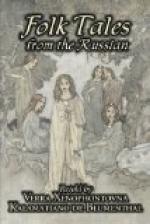“Why so sad, master?” Woe would ask, when the poor man sighed. “Listen to me, I want to teach thee a song, my beloved little song:
“I am Woe, the brave,
I am Woe, the bold;
He who lives with me
Has his griefs controlled,
And when money is lacking
I’ll find him gold.
Attention, master, thou hast twenty-five copecks; let us go and buy some wine; let us have a jolly good time.”
The poor man obeyed. They went and spent all in drink. After this the unlucky fellow, with the faithful Woe on his shoulders, came home. His wife was sad, his little children were hungry and in tears, but he, under the influence of Woe and wine, danced and sang.
On the next day Woe began to sigh and said:
“I have a drunken headache. Let us drink more.”
“I have no money,” answered the poor man.
“Hast thou forgotten my little song? Let us trade the harrow, the plow, the sledge, the telega for money, and let us have a good time.”
“All right.”
The poor, weak man had no courage to refuse, and Woe Bogotir became his master and ruler. They went to a kabak and spent everything; drank, sang, and had a good time.
On the next day Woe sighed again and said to the peasant:
“Let us drink; let us have a jolly time; let us sell or trade everything left, even ourselves.”
Then the fellow understood that his ruin was near and decided to deceive the sorrowful Woe, so he said:
“I once heard the old people say that behind the village, near the dark forest, there is buried a treasure, yes, a great treasure, but it is buried under a large, heavy stone, too heavy a stone for one man to move. If we could only remove that stone, thou and I, Woe Bogotir, could have a good time and plenty to drink.”
“Let us hasten!” screamed Woe; “the Bitter Woe is strong enough to do harder things than to move stones.”
They went a roundabout way behind the village and saw the great big stone, such a heavy stone that five or six strong peasants could never begin to move it. But our poor fellow with his faithful Woe Bogotir removed it at once. They looked inside. Under the stone there was a pit, a dark, deep pit. At the bottom of that pit something was twinkling. The peasant said to Woe:
“Thou bold Woe, jump in, throw the gold out to me and I will hold the stone.”
Woe jumped in and laughed out loud.
“I declare, master,” he screamed, “there is no end of gold! There are twenty and more pots filled with it,” and Woe handed one pot to the poor man, who took the pot, hastily hid it under his blouse, and slipped the heavy stone into its place. So Bitter Woe remained in the deep pit and the peasant thought to himself, “Now there is the right place for my comrade, for with such a friend, even gold would taste bitter.”
The crafty fellow made the sign of the cross and hurried home. He became quite a new man, courageous, sober, and industrious; bought a grove and some cattle; remodeled the izba, and even started a trade. And very successful he was, too. Within a year he earned much money, and in place of the old hut built a fine, new log cabin.




